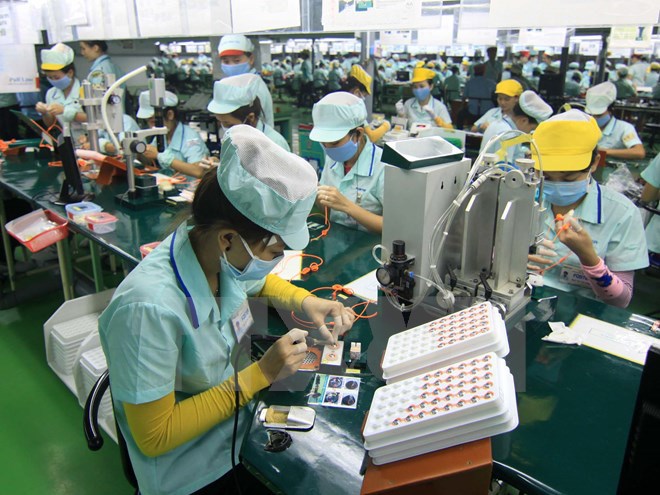Between the US and China, Vietnam looks to hi-tech for growth
During Biden's visit, Vietnam announced a historic strategic partnership with the United States almost 50 years after the Vietnam War. Since 2017, many big tech companies have left China in favour of its communist neighbour in Southeast Asia, investing in semiconductors and electric vehicles, which are also growing domestically. However, it would be wrong to assume that Vietnam is moving away politically from China.
Hanoi (AsiaNews) – Vietnam announced a strategic partnership with the United States during the visit of US President Joe Biden to Hanoi aimed at “peace, cooperation and sustainable development".
The agreement highlights the evolving US-Vietnamese relationship almost 50 years after the end of the war in Vietnam, as well as Vietnam’s progress in recent years in becoming a technological hub at China’s expense, especially in semiconductors, electric cars, and products related to artificial intelligence.
Trade tensions between China and the United States have led to the reallocation of supply chains at least since 2017, but driven further during the pandemic as a result of China’s strict "zero COVID" policies.
Last year big tech firms like Apple, Google and Samsung started to move production to Vietnam, which, in addition to being close to China, offers cheap labour and a stable political environment thanks to the country’s one-party communist regime.
The United States has become, the Southeast Asian nation's second-largest trading partner after China.
This morning, Biden and representatives of major US companies attended the Vietnam-US Innovation & Investment Summit with their Vietnamese counterparts, centred on setting up and expanding factories and facilities for assembling, packaging, and testing of microchips.
Agreements have also been signed in aviation and artificial intelligence, while companies like Microsoft, Nvidia, Marvell and Amkor have pledged significant investments as a way to reduce their reliance on China.
Amkor plans to open, for example, a new US$ 1.6 billion semiconductor manufacturing plant next month near Hanoi. Intel has invested US$ 1.5 billion in a chip assembly plant in the south of the country, its largest in the world, which could be expanded in the future, it is reported.
The semiconductor market is expected to grow to $US 165.7 billion million by 2027 in Vietnam. This is driven by the growth of smartphone use in the country, currently at 61.3 million, but expected to expand further thanks to wider use in suburban and rural areas.
The Vietnamese government has also given top priority to the development of the 5G network. Currently, about 40 different brands of mobile phones are exported from Vietnam, including devices made for giants like Sony and Samsung.
One of the main challenges, experts point out, is the lack of skilled labour, a problem that might be solved through the agreements with the United States.
The electric car sector is also booming. In mid-August VinFast Auto Ltd, Vietnam's largest electric vehicle manufacturer, became a publicly traded company in the United States; after the first day, it was worth about US billion, far more than Ford (US$ 48 billion) and General Motors (US$ 46 billion).
The company's founder, Phạm Nhật Vượng, Vietnam’s wealthiest man, said he hopes his car can compete soon with Elon Musk's Tesla, the market leader.
Established in 2017, VinFast is part of the Vingroup, the largest conglomerate in Vietnam. At present, it is the only exporter of vehicles from Vietnam. Since late last year, it has shipped about 3,000 vehicles to North America, but has yet to make any profits.
It is now looking to boost its electric vehicle penetration in Vietnam's ride-hailing sector through discounts and no-interest loans on motorbikes, this in a country with 70 million gas-fuelled motorbikes that could be replaced by electric ones.
Meanwhile, China is closely monitoring these developments. For a couple of days, hundreds of lorries carrying bananas, durians and dragon fruits from Vietnam bound for China were held up at the border, ostensibly for quality checks, Vietnamese authorities said.
The fact that they were stopped during US President Joe Biden's visit to Hanoi suggests that more than quality control was involved, especially since China is Vietnam’s largest export market for agricultural products.
Since the 1990s, Hanoi has pursued a policy of friendship “with all countries in the international community struggling for peace, independence, and development”; to this end, it has concluded strategic partnerships with South Korea, Australia and Singapore to resist Chinese aggressiveness in the South China Sea,
Nevertheless, China remains Vietnam’s largest trading partner. Chinese companies have heavily invested in Vietnam in the last 10 years, using it as a platform to access the US market. It would thus be wrong, analysts warn, to hastily conclude that it is moving away politically from China.
Instead, like many other Southeast Asian countries, Vietnam is using US-Sino tensions to boost its own interests and economy.
12/02/2016 15:14
04/03/2025 15:36







.png)










